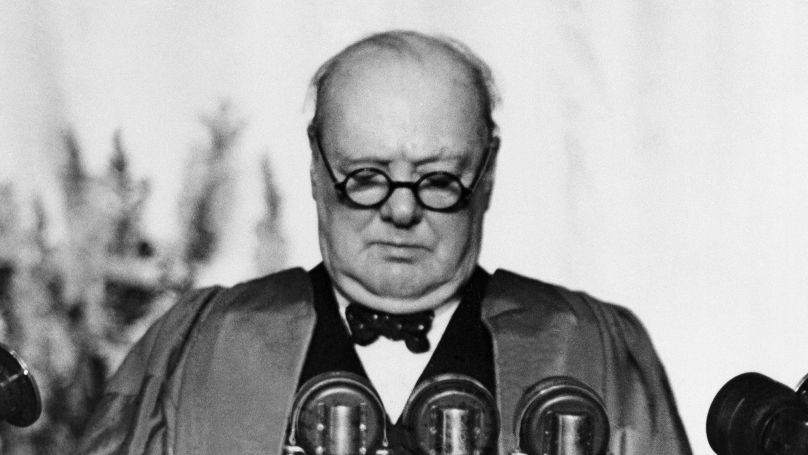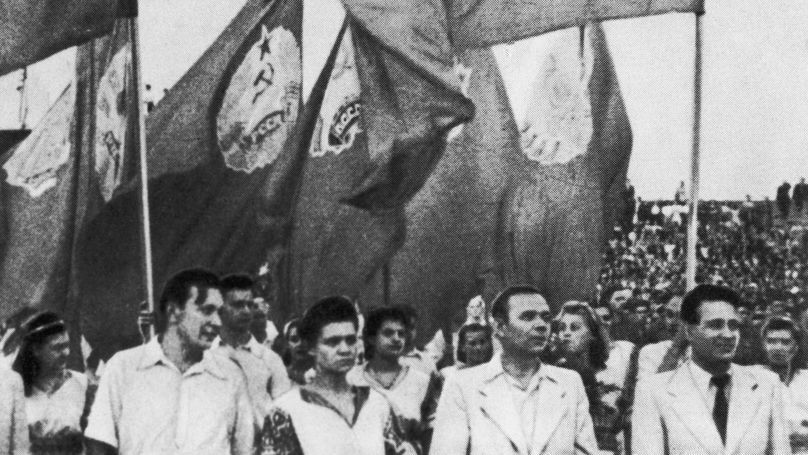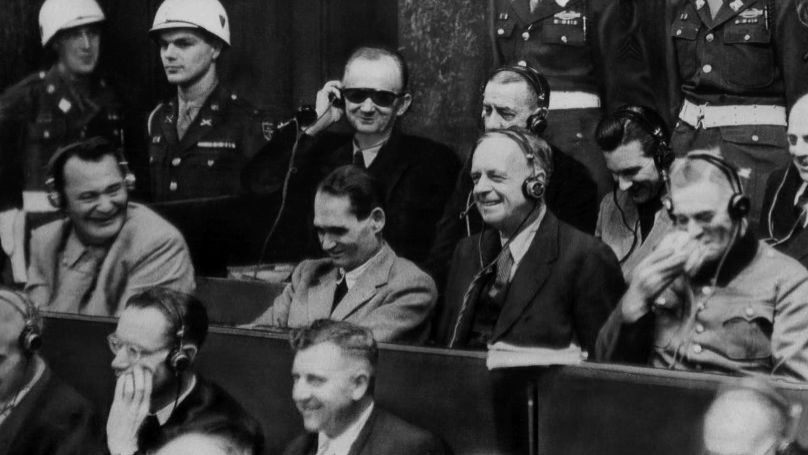Seventy-five years ago on 5 March 1946, the world entered into the Cold War that defined the political and economic processes of the second half of the 20th century and ended only with the collapse of the USSR. Former British Prime Minister Winston Churchill delivered his famous speech at Fulton, US, where he spoke of the threat of Soviet expansion and proclaimed that an Iron Curtain had been drawn between Eastern and Western Europe. After Fulton, the outcome of the Nuremberg Trials became uncertain – relations between the great powers broke down – and the Nazi criminals saw hope for salvation.
Between the Second World War and the Cold War
After the war, contradictions between the allies in the anti-Hitler coalition were constantly increasing. Communist influence in Europe and South-East Asia was expanding, in Greece there was a civil war between communists and anti-communists, the USSR made territorial claims against Turkey and delayed the withdrawal of troops from Iran. Joseph Stalin insisted that, as the main victor in the war against Nazism and the most affected country, the Soviet Union had more legitimacy in the post-war order establishment.
By early March 1946, tensions between the USSR and United States had reached their highest point – American President Harry Truman even threatened to use nuclear weapons. The "Totality" plan was prepared – the first American plans for a war with the USSR (the British "Unthinkable" operation plan was ready in the summer of 1945). On the other hand, liberal and socialist circles in the West believed that the friendly relations with the USSR that had been established during the war could be maintained further, and the claims of the Soviet Union were caused by concern for its own safety, as well as by the desire to compensate for the suffering and loses of the Second World War.
Former British Prime Minister Winston Churchill, who ceded the position to Labour Party Clement Attlee on July 26, was always a consistent anti-communist. Although he did a lot for the union of Great Britain and the USSR, he perceived it as a union against a common enemy. “I have only one goal – to destroy Hitler, and this simplifies my life significantly,” Churchill said in a conversation with his private secretary on June 21, 1941. “If Hitler invaded hell I would make at least a favourable reference to the devil in the House of Commons.”
The prime minister understood that after World War II, Great Britain lost its status of a leading European power, and the devastated countries of Western Europe would not be able to resist Soviet expansion. In such circumstances, only the United States could stop the Soviet Union.

Churchill nurtured the main theses of the Fulton speech since 1943 – Stalin knew it even before the Yalta Conference. The prime minister spent the winter of 1945-1946 in the United States on doctors` advice. As early as December he accepted the invitation from Westminster College in Fulton to lecture on "international relations." Fulton was the birthplace of President Truman, so Churchill made it a condition that Truman must be present during the speech. On the way to Fulton, the American president looked at the text and called the speech "excellent." In his words, "although it will cause confusion, it will only lead to positive results." At the same time, Truman did not officially express his attitude to the ideas of Churchill: in March 1946, he was already a private individual.
"The fraternal association of the English-speaking peoples"
What did Sir Winston say at Westminster College?
He stated, that "the United States stands at this time at the pinnacle of world power.” Two giant marauders stand against it — " war and tyranny.”
Churchill:
"We cannot be blind to the fact that the liberties enjoyed by individual citizens throughout the British Empire are not valid in a considerable number of countries, some of which are very powerful. (…) The only instrument, that can prevent the war in that historical moment and resist tyranny is the fraternal association of the English-speaking peoples. This means a special relationship between the British Commonwealth and Empire and the United States.”

In the second part of the speech, Sir Winston showed his respect to the Soviet Union, but openly cited it as the cause of "international difficulties.”
Churchill:
"A shadow has fallen upon the scenes so lately lighted by the Allied victory. Nobody knows what Soviet Russia and its Communist international organisation intends to do in the immediate future, or what are the limits, if any, to their expansive and proselytising tendencies. I have a strong admiration and regard for the valiant Russian people and for my wartime comrade, Marshal Stalin… We understand the Russian need to be secure on her western frontiers by the removal of all possibility of German aggression. We welcome Russia to her rightful place among the leading nations of the world. We welcome her flag upon the seas. Above all, we welcome constant, frequent and growing contacts between the Russian people and our own people on both sides of the Atlantic.
From Stettin in the Baltic to Trieste in the Adriatic, an iron curtain has descended across the Continent. , - former Prime Minister stated, — Behind that line lie all the capitals of the ancient states of Central and Eastern Europe. Warsaw, Berlin, Prague, Vienna, Budapest, Belgrade, Bucharest and Sofia, all these famous cities and the populations around them lie in what I must call the Soviet sphere, and all are subject in one form or another, not only to Soviet influence but to a very high and, in many cases, increasing measure of control from Moscow.”
Churchill blamed the USSR for “raising” communist parties whose power far beyond their numbers in these countries. And, that those parties are seeking everywhere to obtain totalitarian control. According to him, the danger of communism continues to grow everywhere, "Except in the British Commonwealth and in the United States where Communism is in its infancy.”
Churchill:
"…In a great number of countries, far from the Russian frontiers and throughout the world, Communist fifth columns are established and work in complete unity and absolute obedience to the directions they receive from the Communist centre."

Churchill highlighted that he was not sure the possibility of war had passed forever but he also rejected the idea that a new war was imminent. "I do not believe that Soviet Russia desires war. What they desire is the fruits of war and the indefinite expansion of their power and doctrines, — the former Prime Minister believed.
Churchill:
“From what I have seen of our Russian friends and Allies during the war, I am convinced that there is nothing they admire so much as strength, and there is nothing for which they have less respect than for weakness, especially military weakness. For that reason,n the old doctrine of a balance of power is unsound.”
In conclusion, Churchill said that "Under the auspices of the United Nations and through a military force of the fraternal association of the English-speaking peoples to get along in mutual understanding with Russia. The high-roads of the future will be clear, not only for us but for all, not only for our time, but for a century to come.”
Churchill borrowed the main phrase for his brilliant performance from Joseph Goebbels: the "iron curtain" expression was used by the Hitler Minister of Propaganda in the newspaper "Reich" on 24 February 1945. Other idioms — "shadow which falls upon the world,” " fifth columns" and " police governments", " absolute obedience," " the indefinite expansion of power " were previously used in the West referring the Nazi Germany. By using it for the Soviet Union, Churchill identified a new enemy.
"Mr. Churchill is reminded Hitler"
Stalin hit back. For a couple of days he waited for the respond of the West, but then an article by Academician Yevgeny Tarle (member of the Extraordinary State Commission for the Establishment and Investigation of the Atrocities of the German-Fascist Invaders and Their Accomplices) was published by the Soviet press with a historical review of British foreign policy and the material " Churchill Rattles the Sabre" ... On March 14, the Soviet General Secretary had the interview with Pravda, where he called for restraint, but at the same time put Churchill on a par with Hitler and stressed that he had called on the West to war with the USSR.
Stalin:
"In this respect, one is reminded remarkably of Hitler and his friends. Hitler began to set war loose by announcing his racial theory, declaring that only people speaking the German language represent a fully valuable nation. Mr. Churchill begins to set war loose, also by a racial theory, maintaining that only nations speaking the English language are fully valuable nations, called upon to decide the destinies of the entire world. The German racial theory brought Hitler and his friends to the conclusion that the Germans, as the only fully valuable nation, must rule over other nations. The English racial theory brings Mr. Churchill and his friends to the conclusion that nations speaking the English language, being the only fully valuable nations, should rule over the remaining nations of the world.”
Charging Churchill with "Anglo-Saxon" racism became common for Soviet propaganda in the second half of the 1940s and early 1950s.
"All the defendants were glowing with happiness"
The Fulton speech influenced the Nuremberg trials as well as. Robert Jackson, head of the American prosecution, went on a two-week voyage to Paris, Vienna and Prague, where he gave lectures on the upcoming conflict between the Communists and Democrats. In the report to President Truman, the chief prosecutor for the United States wrote that this way he gave a "visible sign" of American support to local anti-communist forces.
According to Alexander Zvyagintsev, time for joy has come for the defendants after the Fulton speech. "Nazi no.2" Hermann Goering even expressly stated: "Well, now we will defeat them!"
Arkady Poltorak, secretary of the Soviet delegation, recalls that when he entered the courtroom on 12 March before the start of the trial, he discovered a very curious picture. “The defendants' bench resembled a beehive. Even Goering left his usual place: from the right edge of the front row he went to the center”, Poltorak described. “Ribbentrop, Rosenberg, Dönitz, Frank, Sauckel, Schirach gathered around him. Schacht, Papin, Fritzsche, Seyss-Inquart, Neurath were having a discussion in the other corner. (...) Regardless of the "group" affiliation, all the defendants were pleased. Some even had a hidden hope in their hearts.

According to these memoirs, Goering said: "Last summer, I did not hope to see autumn, winter and spring. If I make it to next fall, I will probably see more than one autumn, more than one winter and more than one summer."
The defendants even demanded that the tribunal call Churchill as a witness, and Hess told Goering: "You may yet become the Fuehrer of Germany."
It seemed to the defendants that the trill was about to fell apart and cease its activities. “Everything was done in order to create a rift in relations between Soviet and Western representatives in the Nuremberg Trial. A split that could unravel the entire trial” the Secretary of the Soviet delegation stated.
Conversely, it was silent in the judges' room for three days. The representatives of the prosecution, and even the leadership of the allied countries, who stood behind them, managed to leave contradictions aside. Despite the changed situation, the trial continued as usual.
Sources:
Nikolai Zlobin. Unknown American archival material on the U. Churchill’s speech 5.III.1946
Poltorak A., The Nuremberg epilogue
Alexander Zvyagintsev. The Nuremberg report
Nataliya Lebedeva. The USSR and The Nuremberg Trial
Tusa A., Tusa J. The Nuremberg Trial
Hirsch F. Soviet judgment at Nuremberg: a new history of the international military tribunal after World War II
Daniil Sidorov
























